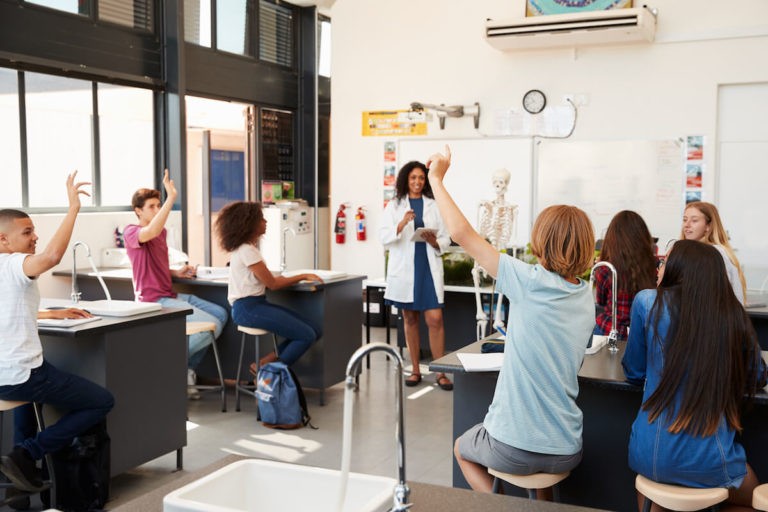So often I hear educators, including myself, saying that one of the most significant issues teachers have to deal with today is a lack of listening skills in our students. In most cases, the heart of the problem is not that students can’t hear their teachers. It’s not that they can’t remember what their teachers have said. In most cases, it is not even that they can’t comprehend what teachers are saying. With over 20 years of experience in the classroom, I have seen significant, negative developments when it comes to listening. What I have found is that children have learned, and most are highly proficient, at tuning us out!
Through years of teaching, parenting, and observing, I have discovered that parents have inadvertently taught their children how to ignore them. That ability to ignore or “tune out” is easily transferred to other adults once the skill has been highly developed and practiced. I believe this has occurred because parents allow and even expect to have to repeat themselves many times before their child responds to them.
This is in no small way connected to the rise in technological devices and screen time, both in the hands of children and parents. As kids hyperfocus on their devices, it is easier to block out what they are being told to do. Also parents, for whatever reason, don’t hold children accountable for not immediately responding. It may be a lack of parenting skills or it may be because the parents themselves are distracted with their own phones and devices.
If you grew up as I did, that would not have been acceptable behavior in your own upbringing. I say all of that to say this…listening can no longer be a skill set that we assume students already have when they come to school. Yes, that’s a shame and no, it shouldn’t be that way. But if we are going to see improvement in this area, we must accept it and begin to utilize effective listening strategies in our classrooms.
What is Effective Listening?
Effective listening is defined as being actively absorbed in what a speaker is saying and responding in a way that lets the speaker know their message has been received. Effective listening also involves showing the speaker that you are listening and interested.
We Do It…They Do It
So, the first and most critical step to implementing effective listening strategies in your classroom is to become an effective listener yourself. I know that so often we as educators feel like we have to be the ones doing the speaking in order to be effectively doing our jobs. I think in doing this, we are doing a huge injustice to our students by not allowing them to lead and participate in conversations as we listen and respond.
We should be listening to them for a multitude of reasons. First of all, we should be listening to students talking about their lives, families, and feelings. This allows us to develop meaningful relationships with our students, which I believe is a critical component to learning. We also should be listening to students talking about academics. By becoming effective listeners and modeling those skills to our students, they are more likely to mirror those skills.
The Impact of Effective Listening
The impact that effective learning can have on your classroom is mostly very obvious. If students are better listeners, they will comprehend and retain more information. In turn, they will perform better academically.
However, there are some less obvious benefits of effective listening. Students that feel they are listened to and that what they say is valued have increased self-esteem. They become better communicators in the long run. Some studies have shown that students who have developed effective listening skills can more quickly acquire a new language. Those students also experience lower levels of frustration and anxiety.
How to Encourage Effective Listening Skills
- Note-taking – Students can start from a very young age learning to take notes. It is important that teachers guide students through the note-taking process, particularly in the early stages.
- Practice – Give your students lots of guided practice in listening and speaking. Students need to have the opportunity to listen to one of their peers, ask relevant questions, and convey their understanding. By doing this under teacher supervision, the teacher is able to monitor and provide guidance as needed.
- Establish rules for listening – Post rules for listening in the classroom, such as: “always have eyes on the speaker”, “don’t interrupt”, “give the speaker feedback”, etc. Refer to these often when practicing effective listening.
- Ask questions – Encourage students to ask questions to clarify understanding and to stay actively engaged in listening.
Barriers to Effective Listening
Unfortunately, the conditions that most children have experienced mentioned above have caused students, more often than not, to arrive in our classrooms with built-in barriers to effective listening. However, there are also exterior barriers to effective listening in the classroom. Most of these barriers have to do with factors related to distractibility and behavioral issues. There will always be distractions and behavior issues in every classroom. The trick is to never allow yourself to “tune out” those issues in order to constantly maintain a culture conducive to learning and effective listening.
The bottom line is, as our world evolves and changes, and as we discover new implications of things like handheld technology, various parenting styles, and new cultural norms, we must recognize that before some of our important skills and standards can be taught we must first equip our students appropriately. Providing a firm foundation of effective listening skills is critical in this process.




